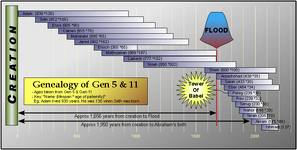excreationist
Married mouth-breather
There are probably a huge number of examples....
This is about Noah and Ham's son Canaan....
Genesis 6:8-9
I'm not sure what the moral of the story is.... don't be the son of someone who pissed off their drunken father.
This is about Noah and Ham's son Canaan....
Genesis 6:8-9
Genesis 9:20-27But Noah found favor in the eyes of the Lord. This is the account of Noah and his family. Noah was a righteous man, blameless among the people of his time, and he walked faithfully with God.
It seems Noah wasn't punished at all... just Ham's son Canaan and his descendants.... in Deuteronomy 20:16-18 it says to wipe out all of the Canaanites (and also Hittites, Amorites, Perizzites, Hivites and Jebusites) Shem and Japheth were blessed but no mention of Ham.Noah was a man who farmed the land. He decided to plant a field that produced grapes for making wine. When he drank some of the wine, it made him drunk. Then he lay down inside his tent without any clothes on. Ham saw his father naked. Then Ham, the father of Canaan, went outside and told his two brothers. But Shem and Japheth picked up a piece of clothing and laid it across their shoulders. Then they walked backward into the tent. They covered their father’s body. They turned their faces away because they didn’t want to see their father naked.
Then Noah woke up from his sleep that was caused by the wine. He found out what his youngest son had done to him. He said,
“May a curse be put on Canaan!
He will be the lowest of slaves to his brothers.”
Noah also said,
“May the Lord, the God of Shem, be praised.
May Canaan be the slave of Shem.
May God add land to Japheth’s territory.
May Japheth live in the tents of Shem.
And may Canaan be the slave of Japheth.”
I'm not sure what the moral of the story is.... don't be the son of someone who pissed off their drunken father.





